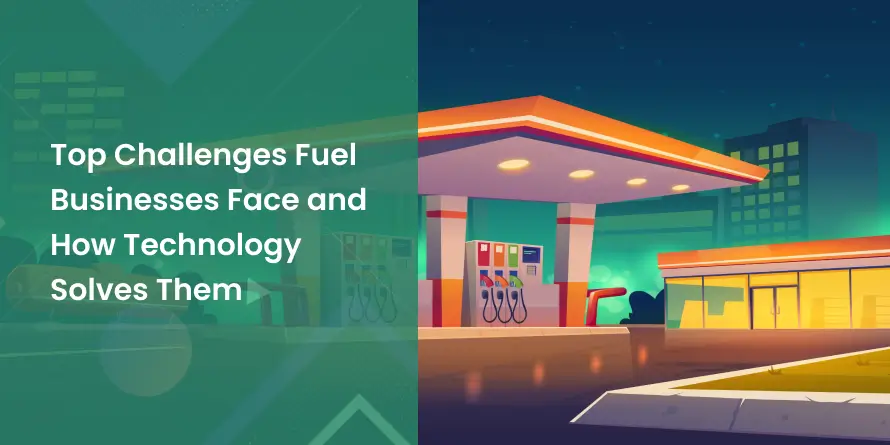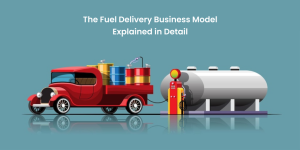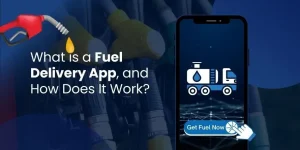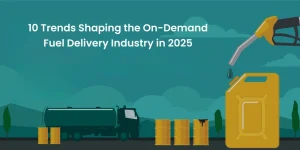Top Challenges Fuel Businesses Face and How Technology Solves Them

The fuel industry is dynamic, and business entities may not always be in the spotlight, working as a cogwheel, making sure that fuel gets delivered to homes, factories, and other modes of transport. Fuel businesses are crucial for the world economy, and entrepreneurs are hardly aware of the challenges that they encounter regularly.
From managing logistics, inventory and supply chain operations to dealing with fuel price volatility and regulatory issues, these major obstacles require detailed roadmaps and modern technology solutions to simplify operations and boost profitability.
Fortunately, emerging technology has been helpful in this by providing us with user-friendly software solutions that are reshaping fuel delivery operations and addressing these major challenges. Thus, emerging technological solutions can help fuel companies cope with numerous problems and avoid difficulties in their work, as well as contribute to the fuelling of a non-conflict environment.
Today, we are looking at the top challenges that fuel businesses face and how software or technology solutions can overcome them.
Current Fuel Business Challenges
Challenges in the fuel business are as constant as the flow of energy’s always changing; it’s always demanding attention. The navigation of these challenges doesn’t just require grit but innovation, foresight, and adaptability. Just as the fuel powers industries, the solutions to those challenges fuel the resilience and growth of the business.
Market Volatility
The fuel industry is sensitive to market forces since oil prices all over the world are very volatile. Geopolitical risks, changes in OPEC policies, physical calamities, and economic fluctuations are some of the reasons that may lead to price flanks or dips.
For instance, the price of oil was negative during the pandemic because the demand drastically reduced, affecting the whole market. Such fluctuations create problems of unpredictability of the future that hampers the capacity of the companies to plan for the long run, hence increasing the risk of finance.
To avoid this, fuel companies need to implement agile strategies, such as hedging as well as diversifying suppliers to protect against unexpected and fluctuating markets.
Regulatory Compliances
The fuel industry is governed by a number of legal factors such as environmental legalities and taxes, national and international laws and policies on fuel safety. Adhering to these regulations can sometimes be expensive and a drain on resources as they change and become more stringent.
For instance, goals regarding carbon emissions and increased fuel quality are pushing enterprises to change rapidly in order to avoid repercussions and be guaranteed as environmentally friendly.
Failure to do so might attract severe penalties or even shut down operations. Hence, fuel businesses must implement compliance management systems and monitor the changes in regulations to reduce exposure to risks and enhance operational legitimacy.
Supply Chain Disruptions
Supply chain systems used by many fuel businesses are greatly disrupted, causing a domino effect on a business’s activities. Catastrophes and hazard events, political insecurity and even strikes can hinder the transit of fuel, which results in scarcity or delay.
For instance, disasters, including Hurricane Katrina or the recent disruptions due to the war in Ukraine can directly affect supply chains of fuel and, consequently, damage production lines. However, demand change during certain seasons or any other unpredictable events like the COVID-19 pandemic influences the supply chain processes significantly.
To overcome these challenges, companies must work on supply chain strategies, such as diversifying suppliers, improving inventory management and using advanced logistic software to keep an eye on fuel movements and avoid deficits.
Environmental and Sustainability Concerns
The increasing concern towards the environment poses an upheaval to the fuel industry, especially with the government and consumers basing their demands on green issues. Organisations are experiencing heightened pressure to lower the amount of carbon dioxide released into the air, embrace clean energy, and adhere to sustainability standards.
In this case, we might discuss how the European Union’s Green Deal and such programmes put increasing pressure on industries based on burning fossil fuels to reduce their emissions. Therefore, fuel involves availability, demand and a need for cleaner practices which most time involves investment in eco-friendly or shifting to other forms of energy.
While this transformation is essential for long-term success, managing the high upfront costs can be a challenge—however, in-house fuel delivery is a cost-saving solution that can optimize operations and reduce expenses.
Digital Transformation and Cyber Security
As most industries are embracing digitisation, fuel businesses have embraced the use of technology in the running of their businesses to make processes efficient and effective and to increase customer satisfaction. However this move towards digitalisation presents its disadvantages, mainly associated with the issue of security.
Fuel is considered one of the primary industries vulnerable to cyber threats for several reasons, namely the industry’s significance and the nature of the information processed. A successful attack could definitely cause some form of intermission in operations or even lead to some form of financial loss that could be damaging to the operation of any firm.
With fuel companies incorporating technology solutions in inventory tracking, equipment maintenance or monitoring, another challenge is the protection of such systems and information from cyber threats. Preservation of data integrity and keeping operational security in the context of the growth of interconnectivity is one of the imperative steps to follow in order to reinforce the industry against new forms of cyber threat.
Experience the Power of Fuel Delivery App with the Powerful Features
How Technology Solves Fuel Business Challenges?
In the face of ever-growing challenges, the adoption of modern technology is the only means to overcome the above issues. With the right technological solutions, fuel businesses can mitigate challenges such as market fluctuations and supply chain or compliance issues.
Doorstep Delivery Solutions
One of the most prominent problems in the present era is time constraint and fuel businesses should capitalise on this by providing fuel delivery at doorstep. As we have seen, with the fuel delivery app development, consumers can order fuel without stepping foot outside their homes or offices.
At the same time, this solution meets the modern consumer’s requirements for simplicity and convenience and reduces the need for massive infrastructure while improving efficiency. A fuel delivery app specifically provides features related to route planning, fuel consumption tracking and real-time reporting for the customers.
Digitisation and Automation
Living in the connected era, digital transformation and automation are the cornerstones of fuel companies. Digitising core activities ranging from stock management to invoicing can help fuel companies reduce the risk of errors and enhance precision and efficiency.
Activities such as fuel management, deliveries, and compliance with the set rules can greatly be done through automation thus helping cut costs and improve the overall performance.
With the help of automated workflows, organisations can guarantee real-time updates, and effective and efficient management of resources and logistics, thus enhancing productivity. The adoption of digital tools also facilitates better decision-making by providing insights into operational data, enabling companies to make more informed choices while reducing manual workload and improving overall performance.
Embracing AI and ML
AI and ML are revolutionizing how fuel companies operate in terms of forecasting, inventory, and customers. Artificial Intelligence solutions can help fuel businesses forecast the need for fuel and plan delivery routes and supply chains more efficiently.
Through the use of AI development services, organizations can implement models that would determine potential negative changes in a particular market before they occur. Furthermore, the application of AI and ML may assist in enhancing decision-making as they possess capabilities in identifying patterns in data and providing viable solutions that help firms in gaining competitive advantage and performing better in the marketplace.
Robotics and Drones
Logistics and delivery services are some of the areas where the use of robotics and drones has already become almost mandatory in the fuel industry. For example, drones can be employed for surveillance of fuel assets as they help in safety and monitoring without any human touch.
On the other hand, robotics can facilitate refueling at stations or warehouses by avoiding human interaction and occupying less time than a human being. They are also efficient in performing dangerous operations, including fuel pipeline maintenance or storage tank inspection, reducing danger, and enhancing performance.
Renewable Energy Integration
With the pressure put on the fuel industry to lessen carbon emissions, the mixing of renewable sources of energy has been seen as an essential solution. Through integrating small hybrid energy systems, a fuel business can expand its energy portfolio and invest in renewable energy technologies such as solar, wind, or biogas.
For instance, integrating solar-technology panels on the roofs of fuel stations or sourcing biofuel to incorporate in the supply system enables companies to age into cleaner product solutions while coping with the regulatory requirements and customers’ demands as well.
Powering the Future of Fuel Business: Embrace Innovation
It is abundantly clear that technology is changing the fuel and energy industry, which will have a ripple effect on how customers order and use energy solutions.
From ordering fuel online to emphasizing on green energy solutions to implementing custom software solutions, there are endless possibilities for how fuel companies can leverage modern tech to enhance the customer experience while simplifying business operations.
As we continue to see advancements in the fuel delivery sector, it’s exciting to think about all the ways that technology will transform the fuel business landscape in the years to come. If you want to talk more about how your business can stay ahead of the curve, contact us, and we will give you further insights into our service.


















